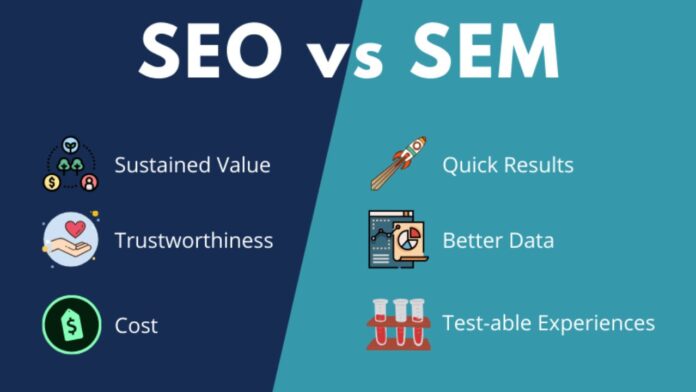In the ever-evolving digital marketing landscape, two acronyms often dominate discussions: SEO and SEM. Search Engine Optimization (SEO) and Search Engine Marketing (SEM) are powerful tools that can significantly impact your website’s online presence and success. But which one is better suited for your specific needs and goals?
This article will delve into the world of SEO and SEM, highlighting their differences, advantages, and when to use each strategy. Let’s embark on this journey to determine which approach can boost your website’s visibility and drive results.
A website’s visibility and rating on search engine results pages (SERPs) can be increased by various search engine optimization (SEO) tactics. Here are some fundamental SEO strategies.
Keyword Research:
Identifying relevant keywords that users search for and integrating them into your content.
On-Page Optimization:
Optimizing meta tags, headers, and content for keywords and improving page load speed and mobile-friendliness.
Quality Content:
Creating useful, educational, and entertaining content that attracts visitors.
Link building:
Increasing the authority of your site by acquiring high-quality backlinks from reliable domains.
Technical SEO:
Ensuring proper website structure, crawlability, and indexability for search engines.
Local SEO:
Optimizing for local searches, including setting up Google My Business and managing online reviews.
User Experience (UX) Improvement:

Make sure that it is easy to use and navigate on your website.
Analytics and Monitoring:
Tracking website performance and adjusting strategies based on data and insights.
SEO vs SEM: Key Differences:
SEO (Search Engine Optimization) and SEM (Search Engine Marketing) are both strategies to increase a website’s visibility on search engines, but they differ in several ways:
Nature:
SEO is organic and focuses on improving unpaid search results, while SEM is paid advertising to appear in search results.
Cost:
SEO is a long-term strategy with lower ongoing costs, while SEM involves immediate costs for clicks and impressions.
Visibility:
SEO results take time to build, whereas SEM provides instant visibility.
Traffic:
SEO primarily targets organic traffic, while SEM targets both organic and paid traffic.
Clicks:
In SEO, clicks are free once you rank, while SEM charges per click.
How Do SEO and SEM Go Hand-in-Hand?

SEO and SEM can complement each other in a holistic digital marketing strategy. Here’s how:
Keyword Insights:
SEM can provide valuable keyword data that can inform your SEO strategy.
Testing Ground:
SEM allows you to test keywords and ad copy before committing to long-term SEO efforts.
Brand Visibility:
Combining SEO and SEM can maximize your brand’s presence on search engine results pages.
Traffic Boost:
SEM can provide immediate traffic while your SEO efforts build organic traffic over time.
SEO and SEM: Future Prospective:
The future of SEO and SEM is likely to evolve with technology and user behavior. Some trends to watch for include.
Voice Search Optimization:
As voice assistants become more popular, optimizing for voice search will be crucial.
Mobile-First Indexing:
Mobile optimization will continue to gain importance.
AI and Machine Learning:
These technologies will impact both SEO (for content optimization) and SEM (for ad targeting).
Local SEO:
As local searches grow, optimizing for local SEO will remain significant.
SEO vs SEM: Which is Better?
There’s no one-size-fits-all answer to whether SEO or SEM is better because it depends on your goals, budget, and timeline. Ideally, a combination of both can yield the best results. SEO is essential for long-term organic growth, while SEM can provide immediate results and is effective for specific campaigns or promotions.
FAQs on SEO vs. SEM:
Can I use both SEO and SEM for the same website? A1: Yes, using both strategies simultaneously to maximize online visibility is common.
Which is more cost-effective, SEO or SEM? A2: SEO is generally more cost-effective in the long run, but SEM can provide quick results for specific campaigns.
How long does it take to see results with SEO? A3: SEO results can take several months to a year to become noticeable, depending on various factors.
What distinguishes organic search results from those that are purchased?
A4: Organic results are unpaid and based on SEO efforts, while paid results appear at the top and are paid for through SEM campaigns.
Can I do SEO and SEM myself, or should I hire professionals? A5: You can do both yourself, but hiring professionals can ensure better results and save time and effort.
In the digital age, a strong online presence is paramount for businesses and individuals. SEO and SEM are two distinct approaches to help you achieve this goal. But before diving deeper, let’s understand what each strategy entails.
Understanding SEO
What is SEO?
SEO, or Search Engine Optimization, is a set of practices to improve a website’s visibility in organic (non-paid) search results on search engines like Google, Bing, and Yahoo. It involves optimizing various elements of your website to rank higher in search engine rankings.
Key SEO Strategies
Key strategies in SEO include keyword research, on-page optimization, content creation, and link building. These efforts are geared towards improving your website’s authority, relevance, and user experience.
Benefits of SEO
The benefits of SEO are numerous. It can generate organic traffic, enhance your website’s credibility, and establish long-term authority within your niche.
Exploring SEM
What is SEM?
Search Engine Marketing, or SEM, is a form of paid advertising that uses keyword bidding to position your ads prominently on search engine results pages (SERPs). It’s a more direct and immediate approach to gaining visibility.
Key SEM Strategies
SEM strategies include pay-per-click (PPC) advertising, ad copy optimization, and budget management. These tactics aim to drive targeted traffic to your website through paid advertisements.
Benefits of SEM
SEM offers quick results, precise audience targeting, and measurable ROI. It’s ideal for businesses looking to generate immediate leads or sales.
SEO vs. SEM: A Head-to-Head Comparison
Cost-Effectiveness
SEO is cost-effective in the long run, as it doesn’t require constant spending once you’ve achieved high rankings. SEM, on the other hand, involves ongoing ad spend.
Time and Speed
SEO is a long-term strategy that takes time to see significant results, often several months. SEM delivers immediate results, making it suitable for time-sensitive campaigns.
Long-term vs. Short-term Goals
SEO is the preferred choice if your goal is sustainable, long-term growth. For short-term goals like product launches, SEM can provide quick wins.
Keyword Targeting
SEO allows comprehensive keyword targeting, while SEM allows precise control over which keywords trigger your ads.
Click-Through Rates (CTR)
CTR tends to be higher for organic search results (SEO) than paid ads (SEM). However, SEM can provide a quick CTR boost.
When to Choose SEO
Establishing Organic Authority
Choose SEO when you want to establish your website as an authority in your industry and build trust with your audience over time.
Sustainable Growth
If your goal is long-term, sustainable growth, SEO’s gradual but steady progress is the way to go.
Content Focus
SEO aligns well with content-driven strategies, making it suitable for blogs and informative websites.
When to Choose SEM
Immediate Results
SEM is the better choice when you need immediate results, such as driving traffic for a flash sale.
Competitive Niches
In highly competitive niches, SEM can help you gain a foothold quickly.
Product Launches and Promotions
SEM is excellent for launching new products or promoting time-sensitive offers.
Combining SEO and SEM
Synergy Benefits
Combining SEO and SEM can provide synergistic benefits, as each strategy complements the other.
Budget Considerations
Balance your budget by allocating resources to both strategies based on your goals and priorities.
Conclusion
SEO vs SEM, In the battle of SEO vs. SEM, there’s no one-size-fits-all answer. Your choice should align with your specific goals, budget, and timeline. For sustainable, long-term growth, SEO is your ally. SEM can deliver quick wins if you need immediate results and have the budget for it. In many cases, a well-thought-out combination of both strategies can maximize your online presence and drive exceptional results.
FAQ
Can I use both SEO and SEM simultaneously?
SEO vs SEM, Absolutely! Combining both strategies can be highly effective, complementing each other’s strengths.
How long does it take to see results with SEO?
SEO results typically become noticeable within several months but vary based on factors like competition and strategy.
Is SEM suitable for small businesses?
SEO vs SEM, Yes, SEM suits small businesses, but budget management is crucial to ensure a positive ROI.



